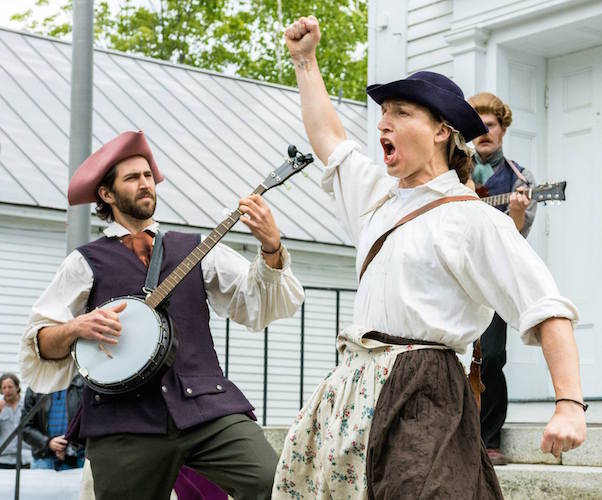Fourth of July Feature: The Devil and “Daniel Shays” — Rebellion Reenacted
Children of the Wild’s Daniel Shays is the ideal response to the once popular 19th century Ballad of Daniel Shays.

A scene from the Double Edge Theatre and Children of the Wild memorialization of the “Shays’ Rebellion. Photo: Kim Chin-Gibbons.
By Don Ogden
With Independence Day upon us a number of our neighbors may recall what some refer to as the real American Revolution, Shays’ Rebellion. That homegrown agrarian insurrection took place right here in Western Massachusetts, a decade after the War of Independence. The uprising was recently memorialized in a high spirited performance by Children of the Wild Ensemble during the Ashfield Town Spectacle in early June.
Along with Ashfield’s own Double Edge Theatre, Children of the Wild took part in various historic recreations during the weekend. The Daniel Shays performance was staged on the granite steps of the Ashfield Town Hall, a fitting venue given that many of the shaysites’ actions involved the closing of courts in various Valley towns in the late 1780’s. Their mission was to ward off the repossession of farms whose owners had fallen hopelessly into debt because of economic chicanery and post-war depression. Called yeomen at the time, these farmers and their families returned from the war with little to show for their sacrifice; they had no real power to counter the oppressive taxation and injustice generated by the wealthy elites, who dominated the post-colonial government in Boston.
The performance and ballad, created by Children of the Wild Artistic Director Walken Schweigert (with some help from John Peisto and Bob Carlton of Double Edge), evoked the humiliation and agitation of a turbulent period in our history whose resonances with today’s glaring disparities in income and political clout are stunningly obvious.
Schweigert’s ballad, performed by the troupe in period dress playing accordian, banjo, and guitar (Schweigert on violin), powerfully expresses the tragic plight of Shay and his confederates:
Over the hills and through the trees
These taxes brought them to their knees
The farmers could no longer pay
For lands that they had fought to save
One by one they’re hauled to jail
The valley rang with cries and wails
Of families torn apart
And taverns filled with broken hearts
“We can’t abide this horrid fate
Class, town, continental rates.
The great men will take all we have
I think it’s time for us to rise.
Those last two lines came directly from a letter to the editor of a local paper at the time, penned by a yeoman who called himself “Plough Jogger.” The performers caught the uproarious spirit of the Rebellion in their performance and, in turn, the audience seemed drawn into the struggle, often calling out in support. Children of the Wild’s Daniel Shays is the ideal response to the once popular 19th century “Ballad of Daniel Shays.” The latter vilified Shays as being in league with Satan. The devil in today’s ballad is in the details of state domination and corruption.
Don Ogden — producer/co-host of the The Enviro Show, WXOJ & WMCB
Tagged: Ashfield Town Hall, Children of the Wild, Double Edge Theatre, Shays’ Rebellion
